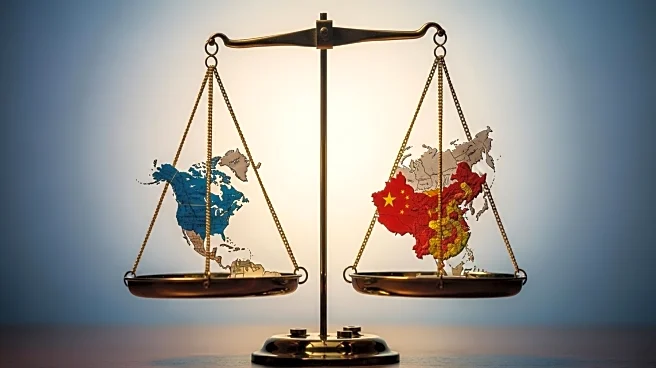What is the story about?
What's Happening?
President Trump initially predicted that China would face significant economic difficulties due to U.S. tariffs, expecting that the reliance on American consumers would force Beijing to make concessions. However, recent data indicates that China has successfully diversified its export markets, leading to an 8.3% increase in exports in September 2025 compared to the previous year. This growth is largely attributed to increased exports to regions like the European Union, despite a 27% decline in shipments to the U.S. The World Bank has revised its growth expectations for China's economy, now projecting a 4.8% growth for 2025, up from the earlier estimate of 4%. In contrast, the U.S. growth forecast has been reduced to 1.4% for the same period.
Why It's Important?
The shift in China's export strategy highlights the limitations of unilateral tariff policies and their impact on global trade dynamics. By successfully redirecting its exports to other regions, China has mitigated the effects of U.S. tariffs, challenging the effectiveness of President Trump's trade strategy. This development could influence future U.S. trade policies and negotiations, as the anticipated leverage over China may not materialize as expected. The economic resilience demonstrated by China may prompt other countries to reconsider their trade dependencies and strategies, potentially leading to a more diversified global trade environment.
What's Next?
With both countries operating under a pause on reciprocal tariffs until November 10, there is room for negotiation and potential compromise. President Trump has expressed optimism about reaching an agreement with China, citing a strong relationship with President Xi Jinping. Market analysts suggest that the ongoing tariff discussions may be part of broader negotiating tactics, with the possibility of a deal being reached before the deadline. The outcome of these negotiations could have significant implications for international trade relations and economic policies.
Beyond the Headlines
The ongoing trade tensions between the U.S. and China may have deeper implications for global economic stability and the future of international trade agreements. The ability of China to adapt and thrive despite tariffs could encourage other nations to pursue similar strategies, potentially reshaping global trade networks. Additionally, the situation underscores the importance of diplomatic engagement and multilateral cooperation in resolving trade disputes, as unilateral actions may not yield the desired outcomes.
















